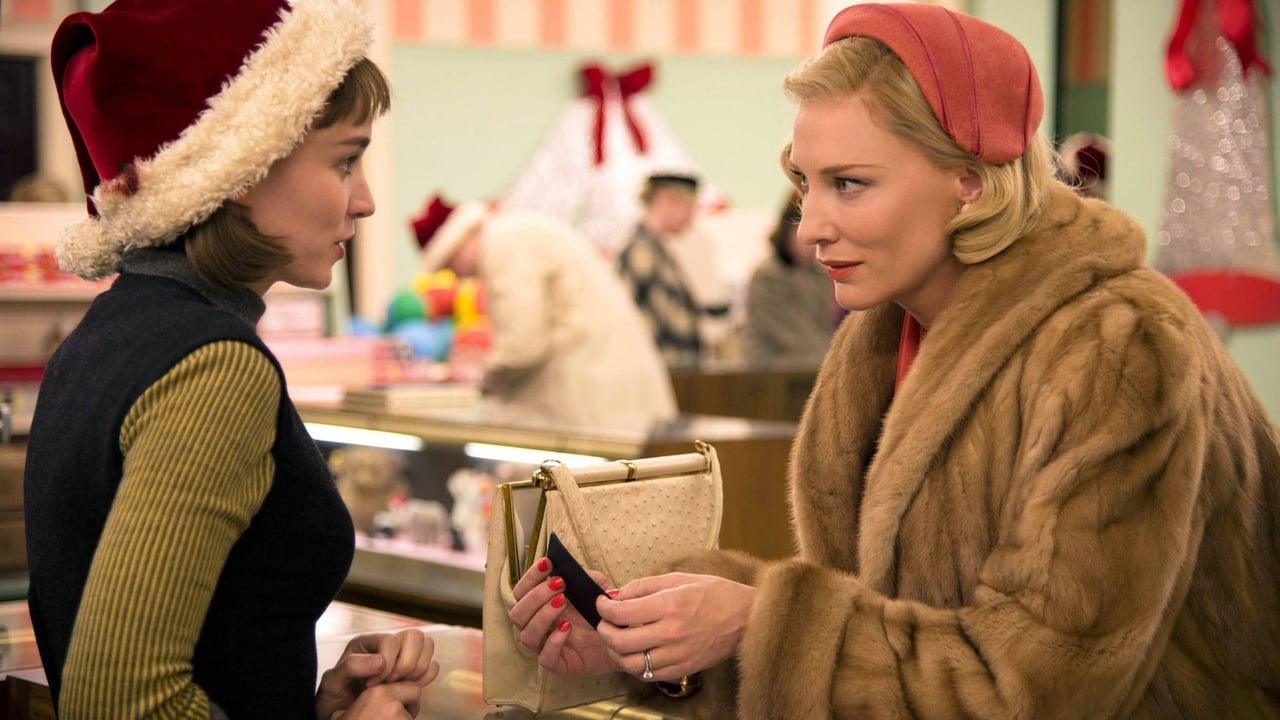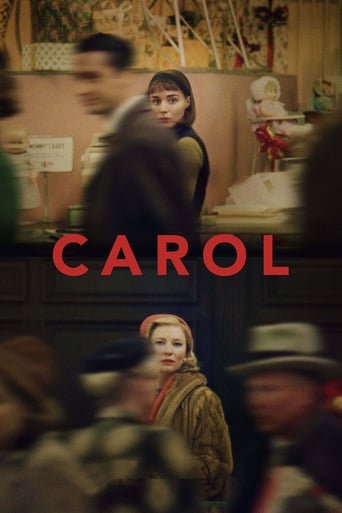

CarolGazing each other across the room or touching someone for the first time or even talk about them to someone else is depicted as electrifying as it is in real life and this is something that very few of them can achieve. Carol is a suave and mild love story that is too practical to be a film and still Todd Haynes pulls it off with Phyllis Nagy's smart adaptation from the novel with enough drama for the audience to rely upon for 2 whole hours. Cate Blanchett and Rooney Mara are the keys that withholds the audience throughout the movie with a great supporting cast like Sarah Paulson and Kyle Chandler. Carol as mentioned earlier is electrifying mortified portrayal of two stellar performances that subdued the smart writing, perfect editing and horrific emotions running in each and every scene in it.
... View MoreThis movie has some magic power and I got addictive to it for more than a year. I love the beautiful feeling between them, subtle but unforgettable! I thought I would cry before I watched it but it turned that I didn't. Then I release that moving things couldn't always make people cry, they may change into another form that makes people still can touch them over months and months. Some people may question that why these two women fell in love suddenly but that is how love runs like. You love someone before you notice that. Also! Love Cate and Rooney! Thank you for your perfect performances!
... View MoreAt its root, Carol is just another Hollywood sacrifice laid at the altar of marital infidelity. It's one of the few films other than Notes on a Scandal (another Blanchet project) that dares to show the predatory nature of lesbians. Despite the low review score I accord Carol, I recommend that it be watched on Netflix solely because of the beauty of the art direction and photography. I'm a sucker for movies set in the first half of the 1950s and I loved the time travel feeling I got while watching this. But . . . let's see. Carol targets Therese (pronounced tuh-REZE don't you know) while Christmas shopping in a NYC department store. For her daughter, Carol buys a model train set upon Therese's suggestion. Apparently a pretty young woman suggesting a masculine gift for a little girl was a gender bender signal in NYC in late 1952. Carol intentionally leaves her exquisite leather gloves on the counter when she leaves. Therese mails them back to her then follows up with a phone call. The tone of the call is the same as the tone of their first conversation in the department store and is the same as every other conversation they will have in the movie; dull as gray on brown. Not a hint of excitement or pleasure in either woman's voice. They meet again and Carol invites Therese out for Christmas. Enter Harge, Carol's cuckolder husband who instantly sniffs out the nature of the women's relationship. Harge is drunk and belligerent but he professes love for Carol and a desire to be together. Harge leaves with the daughter for Christmas in Florida. Things plod along. We see Therese taking some pictures, declining an advance by a nice fellow who works for the Times, and acting pretty disinterested in a guy who I think was her pre-Carol romantic interest. Next we have "Carole and Therese's Boring Road Trip" where they meet a geeky guy who is a travelling salesman of notions, although he tells them he doesn't know what notions are. That night things get hot and Therese tells Carol in a monotone "take me to bed." We then have a scene of perfunctory semi nudity (the wannabe star shows more skin than the star has to show). They fall asleep in each other's arms. More gray on brown. The ONLY emotion shown in the flick occurs the next morning when Carole finds out the notions salesman was a private eye who rented the room next to them and tape recorded the gray on brown lovemaking. Carol is distraught and leaves for New York and her friend (and former lover) Abby comes to drive Therese home. Fast forward to the pre-divorce attorney and client conference where Carol is pretty quick to give custody to Harge so long as she has visitation rights. Carol and Therese later meet for a drink and Therese declines an invitation to go to a fancy restaurant where Carol is meeting friends. After accepting a friend's invitation to a party, Therese later goes to the crowded restaurant and spots Carol at a table full of people. Therese ... walks ... slowly ... toward ... Carol ... until ... Carol ... sees ... her. Their gazes lock in what appears to be a freeze frame. The end. At last. Now, I've been in love, though never in a same sex relationship. And I've fallen hard, and I've been infatuated. But never have I been as emotionless about it all as these 2 were. I get that this was 1952 and that lesbians had to hide in plain site (like those 2 stereotypes in the record store) and I didn't expect them to be holding hands while walking down 5th Avenue. But . . . when they were alone, still gray on brown? Never a laugh, a smile, a joke, a wink, a giggle ... nothing. Just a lifeless reading of the script. The acting in this was pretty darn lousy if you ask me. Maybe they were just following the book but this doesn't show any character, much less character development. Maybe it was just a book that didn't need to be made into a movie. With the exceptions of the little girl and some of Therese's friends, everyone in this movie is bored to the point of self-destruction. It's Christmas in New York but where is the joy? It's as if a giant Hoover vacuum was used to suck the life out of New York. I'm giving it a 3 because I'm a nice person.
... View MoreWhat I loved most about this film, except its unique protagonists, Cate Blanchett, who plays a powerful woman living the "perfect life" in New York having a child and a successful husband and Rooney Mara, an Audrey Hepburn figure, elegant, innocent and brave, ready to fall in love even if it 'll cost her a lot, is the unique, magnificent photography. The colors, the textures, clothing, everything is excellent, depicting this golden era of New York Times and urban life in New York. I also liked the ending. Director gives us these intense gazes from both sides of the two women and finally, in a Hollywood production, we are not sure of the exact ending of their last meeting together.
... View More